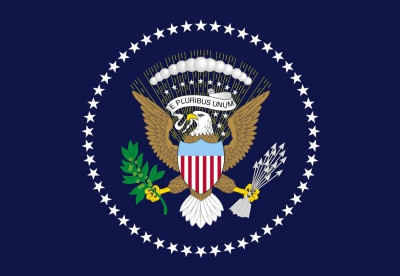Abraham Lincoln's patent relates to an invention to buoy and lift boats over shoals and obstructions in a river. Abraham Lincoln conceived the invention when on two occasions the boat on which he traveled got hung up on obstructions. Lincoln's device was composed of large bellows attached to the sides of a boat that were expandable due to air chambers. Filed on March 10, 1849, Lincoln's patent was issued as Patent No. 6,469 later that year, on May 22. His successful patent application led to his drafting and delivering two lectures on the subject of patents while he was president.
Lincoln was at times a patent attorney and was familiar with the patent application process as well as patent lawsuit proceedings. Among his notable patent law experiences as a result of his patent was litigation over the mechanical reaper; both he and his future Secretary of War, Edwin Stanton, provided counsel for John Henry Manny, an inventor. The original documentation of Lincoln's patent was rediscovered in 1997.
The president of the United States (POTUS) is the head of state and head of government of the United States of America. The president directs the executive branch of the federal government and is the commander-in-chief of the United States Armed Forces.
The power of the presidency has grown substantially since the office's establishment in 1789. While presidential power has ebbed and flowed over time, the presidency has played an increasingly strong role in American political life since the beginning of the 20th century, with a notable expansion during the presidency of Franklin D. Roosevelt. In contemporary times, the president is also looked upon as one of the world's most powerful political figures as the leader of the only remaining global superpower. As the leader of the nation with the largest economy by nominal GDP, the president possesses significant domestic and international hard and soft power.
Article II of the Constitution establishes the executive branch of the federal government and vests the executive power in the president. The power includes the execution and enforcement of federal law and the responsibility to appoint federal executive, diplomatic, regulatory, and judicial officers. Based on constitutional provisions empowering the president to appoint and receive ambassadors and conclude treaties with foreign powers, and on subsequent laws enacted by Congress, the modern presidency has primary responsibility for conducting U.S. foreign policy. The role includes responsibility for directing the world's most expensive military, which has the second largest nuclear arsenal.
The president also plays a leading role in federal legislation and domestic policymaking. As part of the system of checks and balances, Article I, Section 7 of the Constitution gives the president the power to sign or veto federal legislation. Since modern presidents are also typically viewed as the leaders of their political parties, major policymaking is significantly shaped by the outcome of presidential elections, with presidents taking an active role in promoting their policy priorities to members of Congress who are often electorally dependent on the president. In recent decades, presidents have also made increasing use of executive orders, agency regulations, and judicial appointments to shape domestic policy.
The president is elected indirectly through the Electoral College to a four-year term, along with the vice president. Under the Twenty-second Amendment, ratified in 1951, no person who has been elected to two presidential terms may be elected to a third. In addition, nine vice presidents have become president by virtue of a president's intra-term death or resignation. In all, 45 individuals have served 46 presidencies spanning 58 full four-year terms.Joe Biden is the 46th and current president of the United States, having assumed office on January 20, 2021.

1849May, 22
Future U.S. President Abraham Lincoln is issued a patent for an invention to lift boats, making him the only U.S. President to ever hold a patent.
Choose Another Date
Events on 1849
- 13Feb
Franz Joseph I of Austria
The delegation headed by Metropolitan bishop Andrei Șaguna hands out to the Emperor Franz Joseph I of Austria the General Petition of Romanian leaders in Transylvania, Banat and Bukovina, which demands that the Romanian nation be recognized. - 29Mar
Punjab region
The United Kingdom annexes the Punjab. - 14Apr
Lajos Kossuth
Hungary declares itself independent of Austria with Lajos Kossuth as its leader. - 3Jul
Italian unification
The French enter Rome in order to restore Pope Pius IX to power. This would prove a major obstacle to Italian unification. - 17Sep
Harriet Tubman
American abolitionist Harriet Tubman escapes from slavery.

 English
English  español
español  français
français  português
português  русский
русский  العربية
العربية  简体中文
简体中文 